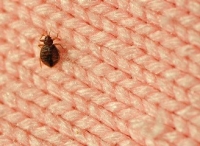Healthy Homes - Bed Bugs
What do bed bugs look like?
Bed bugs are small, flat insects. Bed bugs are reddish-brown in color and do not fly. Bed bug eggs and nymphs are tiny and can be very difficult to see. Bed bug adults can be up to 1/3 inch or about the size of President Lincoln’s head on a penny.
How can I tell if bed bugs are in my bed?
Bed bugs often bite people at night during sleep. One of the easiest ways to identify a bed bug infestation is by the tell-tale bite marks on the face, neck, arms, hands or any other body parts while sleeping. It is important to look for other bed bug clues where you sleep. These clues include bed bug skins after molting, blood spots on bedding, or a sweet musty odor.
How can I tell a bed bug bite from other bug bites?
Bed bug bite marks are similar to that of a mosquito or a flea -- a slightly swollen and red area that may itch and be irritating. It is hard to tell if you’ve been bitten by a bed bug unless you find bed bugs or signs of infestation. When bed bugs bite, they inject an anesthetic and an anticoagulant that prevents a person from realizing they are being bitten. Most people do not realize they have been bitten until bite marks appear from one to several days later.
What health risks do bed bug bites pose?
Bed bugs are not known to spread disease.
To cope with bed bug bites try to avoid scratching and apply antiseptic cream or lotion. Maybe take an antihistamine. People who excessively scratch itchy bug bites can increase the chance of a secondary skin infection.
Bed bug bites affect everyone differently. Some people may have no reaction and will not develop bite marks or visible signs of being bitten. Other people may be allergic to the bed bugs and can react with enlarged bite marks and painful swelling at the bite site. Bed bugs bites are not considered to be dangerous, though an allergic reaction may need medical attention.
Who has good websites about bed bugs?
In addition to the information on this page, we can recommend the information on the Environmental Protection Agency’s bed bug webpage and the University of Tennessee’s bed bugs webpage. These websites are updated regularly and have high-quality, peer-reviewed information and photographs of bed bugs.

Government partners
Tennessee Department of Health
Pesticides
www.tn.gov/health/cedep/environmental/environmental-health-topics/eht/pesticides.html
University of Tennessee
Bed Bugs in Tennessee
bedbugs.tennessee.edu
Environmental Protection Agency (EPA)
Bed Bugs: Get Them Out and Keep Them Out
www.epa.gov/bedbugs
Centers for Disease Control and Prevention (CDC)
Bed Bug FAQs
www.cdc.gov/parasites/bedbugs/faqs.html
Other resources
Stop Pests in Housing
Integrated Pest Management (IPM) resources
www.stoppests.org
Helpful documents
University of Tennessee
Affordable Bed Bug Management?
Bed Bugs Management and Prevention
Centers for Disease Control and Prevention (CDC)
Healthy Advisory: Health Concerns about Misuse of Pesticides for Bed Bug Control
